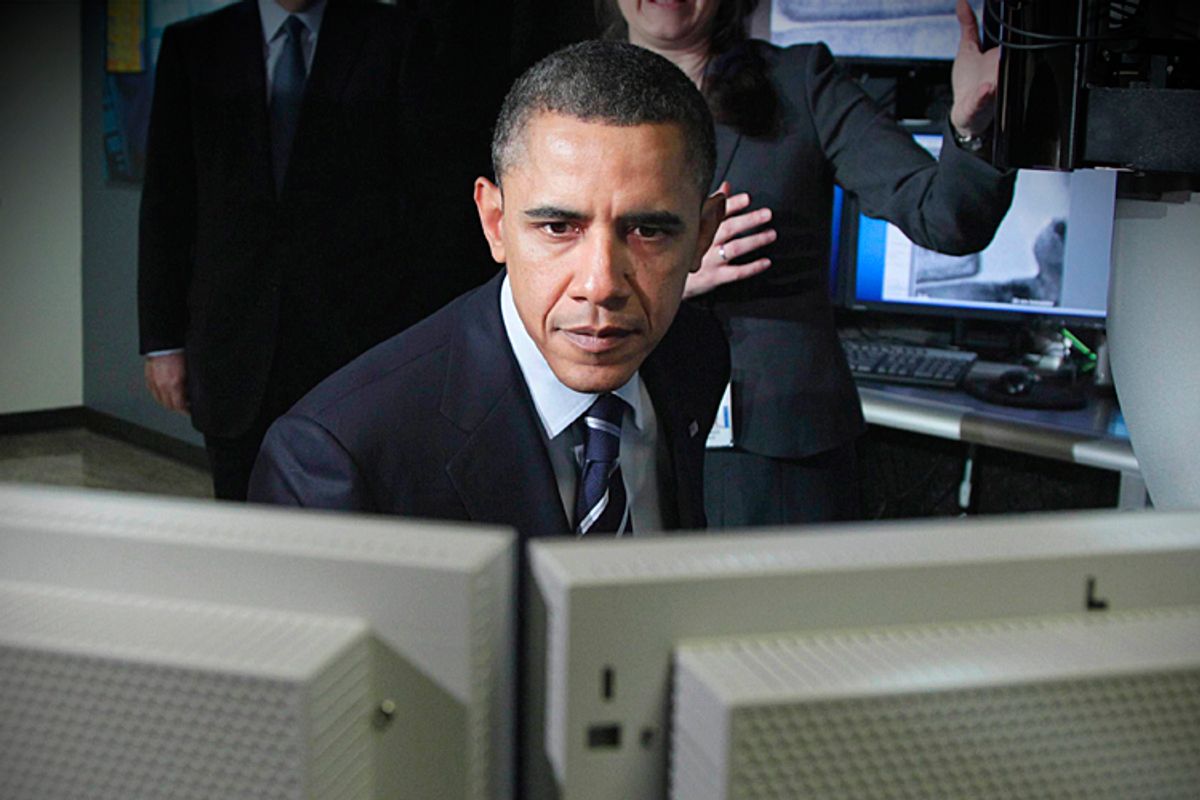On Thursday, a series of scoops about the National Security Agency's vast surveillance dragnet, covering every aspect of U.S. communications networks, exploded across the media and prodded public outrage. As far as government scandals go, these surveillance revelations reverberate like earthquakes: We'd felt the tremors before; those who were truly shaken by yesterday's news just didn't know they were already standing on the fault lines.
As NSA whistle-blower Thomas Drake told me on Thursday, "these surveillance practices have been going on since after 9/11 ... the Patriot Act was the enabling mechanism that allowed the United States government in secret to acquire subscriber records from any company ... ” But, as Drake and many of us concerned about civil liberties will insist: that because a program has been in place for years -- that we've known about it, or perhaps half-known -- doesn't mean it's OK.
Yet, as predictably as earthquakes bring aftershocks, the NSA bombshells have been followed swiftly by a predictable trail of damage limitation from the Obama administration and active defenses from a number of Congress members and, notably, the Wall Street Journal. With a typical grounding in War on Terror rubric, the defenses flew forth for the fact that the government has been secretly hoarding metadata on pretty much every piece of electronic communication within and from the United States.
"I’m glad the NSA is trying to find out what the terrorists are up to overseas and in our country,” said the ever-hawkish Sen. Lindsey Graham, R-S.C. "Programs like this have great utility," said Sen. Marco Rubio, R-Fla. Senate Intelligence Chairwoman Dianne Feinstein, when asked whether the NSA's phone record surveillance had thwarted terror attacks, responded, "It has, but that's classified."
Meanwhile, a Wall Street Journal editorial thanked the NSA for its data hoarding. "The NSA's Metadata program is legal and necessary," it noted, explaining:
The effectiveness of data-mining is inversely proportional to the size of the sample, so the NSA must sweep broadly to learn what is normal and refine the deviations. A nongovernment analogue might be the credit card flags that freeze payment when, say, a New Yorker goes on a shopping spree in Phoenix... Amid many real abuses of power, the political temptation will be to tie data-mining into a narrative about a government out of control. Such opportunism can only weaken our counterterror defenses and endanger the country.
The arguments here are specious, and not simply within a base civil liberties vs. counterterror polemic. First, it's worth noting that a government agency's blanket collection of metadata is vastly disanalogous to a credit card company freezing a card when noting unusual activity: Credit card customers sign up for credit cards with the precise knowledge that credit card companies will follow the card's transactions. Verizon and Facebook users do not sign up to these communications networks with the understanding that the government will be able to trace from where and to where calls and messages are made and sent. That the government has access to this metadata has been kept top secret.
Second, arguments on counterterrorism speciously presume that a vast dragnet -- because there may have been instances of thwarted attacks with such programs -- is thus the best approach to thwart attacks. The logic is abysmal. There's little doubt that vast, secret surveillance programs, which treat everyone as a potential person of interest, can be used to catch "the bad guys." But here's the rub: If more precise, less sprawling, but as effective, national security programs were available -- ones that didn't so decimate Fourth Amendment protections -- a reliance on mass data hoarding becomes indefensible.
The NSA has a history of opting for hulking, imprecise dragnets above more targeted approaches. The reason Thomas Drake was indicted under the Espionage Act was because he blew the whistle on the Trailblazer program -- a post 9/11 program developed to analyze data carried on communications networks. Controversially (and this is what Drake made public), the over-budget Trailblazer was chosen over a similar program named ThinThread, a less costly project that had been designed with built-in privacy protections. Trailblazer was canceled when a congressional investigation ruled it wasteful, ineffective and over-budget. But Drake and other civil liberties advocates point out that the NSA has not moved away from a "collect everything, target later" approach -- quite the opposite. If this week's revelations illustrate anything, it's that the government has little interest in streamlining surveillance in deference to constitutional protections; there's a consensus in the national security community over relying on dragnets.
Defending the surveillance state because it has served to thwart some terror attacks misses a huge number of other factors at play that underpin the government's hoarding attitude. As Drake told me, there is something hugely "seductive" about the ability to surveil every citizen. There's also serious money in it -- huge government contracts, which seem to have fallen conveniently out of these stories, but which play an important role in shaping the programs federal agencies use. It's worth noting that the NSA is currently building an $860 million data center at Fort Meade; Big Brother's big data has big money too.
Top secret programs that abrogate all normal expectations of privacy are the national security standard: It's not a defense to say they are effective counterterror tools; such a logic assumes that mass data hoarding is the only way. Reliance on such a logic is not a defense of an effective system, weighed against other possible approaches -- it's an ideology.

Shares